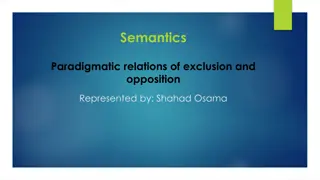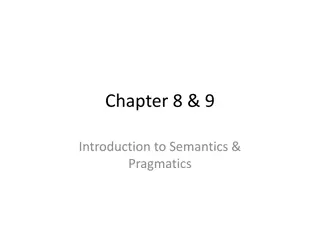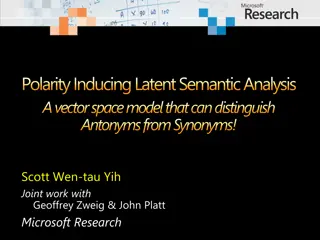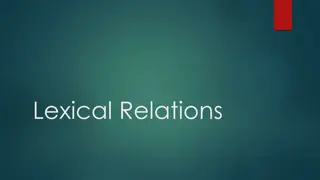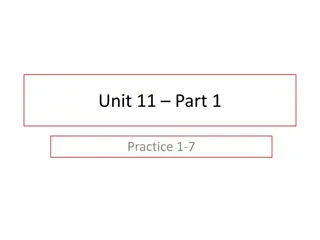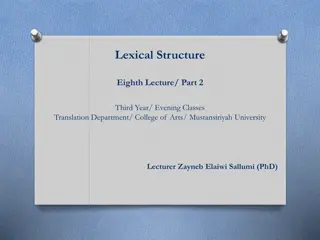Semantics and Paradigmatic Relations of Exclusion and Opposition
The presentation explores the concepts of incompatibility, co-taxonymy, and opposition in semantics. It delves into how certain terms exclude others within a set and the various forms of opposition such as complementaries and antonymy. Examples like "Women, Queen, Mother, Servant, Teacher" illustrat
0 views • 21 slides
Understanding Semantic Relations in Language
In semantics and pragmatics, sense relations are categorized into paradigmatic, syntagmatic, and derivational axes. Paradigmatic relations involve semantic choices within a sentence structure, while syntagmatic relations connect items within the same sentence. Examples include synonymy, hyponymy, me
0 views • 33 slides
Unveiling Polarity with Polarity-Inducing Latent Semantic Analysis
Polarity-Inducing Latent Semantic Analysis (PILSA) introduces a novel vector space model that distinguishes antonyms from synonyms. By encoding polarity information, synonyms cluster closely while antonyms are positioned at opposite ends of a unit sphere. Existing models struggle with finer distinct
1 views • 29 slides
Understanding Lexical Relations in Language
Explore the concepts of synonymy, antonymy, hyponymy, and prototype in linguistics. Learn about words with closely related meanings (synonyms), opposite meanings (antonyms), inclusive meanings (hyponyms), and characteristic examples (prototypes) within lexical relations.
0 views • 12 slides
Understanding Analyticity and Antonymy Concepts
Explore concepts like analyticity, paraphrases, antonymy, and binary antonyms in this practice exercise. Learn about sense relations, contradictory statements, and word opposites. Dive into identifying binary antonyms and understanding four-way contrasts. Enhance your understanding of semantics and
0 views • 39 slides
Understanding Lexical Structure: Antonymy, Hyponymy, and Components
Antonymy refers to words with opposite meanings, divided into gradable and non-gradable categories. Hyponymy involves one term's meaning being included in another. Relational opposites show reversal of relationships, while componential analysis breaks down word meaning into distinct elements.
0 views • 7 slides
